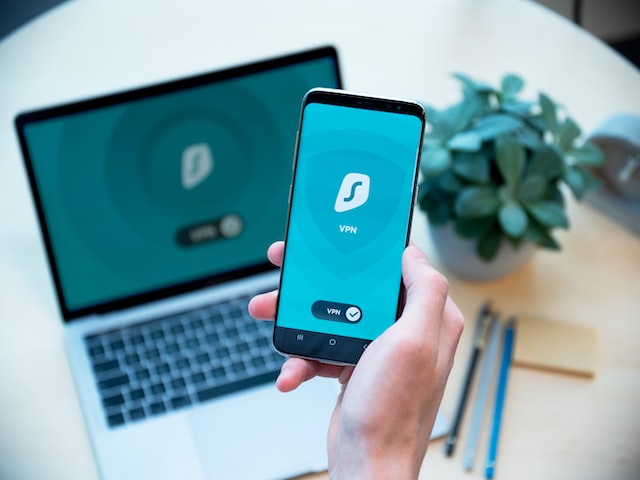VPNs that aren’t reliable talk openly about their lifetime subscriptions, free plans, or claims of total anonymity. These may look appealing, but you need to keep your guard up. Even safe VPNs could be selling your personal information behind your back. You’ll lose money and expose yourself to danger if you do this. The best way to keep your data safe while using a VPN is to be aware of the most common scams and how to avoid them.
Is using a virtual private network (VPN) a scam?
A virtual private network, or VPN, is a trustworthy means of keeping sensitive information safe. However, the opposite may happen if you fall for a VPN scam and purchase fake or insecure services from shady sources.
There are many variations of scams, but they all share the same goal: to trick their victims into giving up money, property, or sensitive information. Scammers’ motivation to target the VPN industry grows in tandem with its rapid development.
If you can’t trust a VPN, it could share your information with third parties and advertisers, offer poor security, or even infect your devices with malware. To avoid getting tricked by a VPN scam, you should know the most common ones. Do your research and learn to make wise choices so you can keep more of the money you’ve worked hard for.
We did all that work for you and researched online to the best of our abilities.
We looked at different reliable sources online but relied the most on PrivacySavvy.com to devise eight common VPN scams and how to avoid them. Here we go:
- Free Virtual Private Network: A Trap
The advertising of a free VPN service is just a trick to get you to give up your personal information and data. And just as the adage goes, “Nothing in life is truly free,” neither are these Free VPN Scams.
Free VPNs have a terrible reputation for several reasons, including the injection of malware that tracks your online activity, the constant barrage of advertisements, the lack of security assurance, and the provider’s distribution or sale of your personal information. In addition, after a single pass through their Terms and Conditions pages, you will notice discrepancies, ambiguities, and contradictions.
- Fraudulent Logging Attempts
It’s hard to find a VPN service that doesn’t promise total privacy by never keeping track of what users do. But the truth is that almost all VPNs log information in some way. When these businesses don’t say which pieces of information are being stored and which aren’t, they are being sneaky.
If VPNs are going to live up to what users want, they can only be made better by logging some activity. Unfortunately, some VPNs will continue to market themselves as safe services that don’t log anything because it needs to be clarified how they log everything, and it leaves them open to attacks. However, you should only worry a little about this if the service hides the fact that it keeps logs. Visit their outline to learn more about how the company uses data.
- A VPN That Spreads Malware to Your Devices
To offset the costs of running their VPN servers, some companies offer their services for free in exchange for users viewing advertisements during their sessions. But, unfortunately, they don’t advertise that your browsing habits can be monitored and logged behind the scenes of the apps and websites you use.
Some are even more dangerous because they infect your device with malicious content, leaving you wide open to attack from hackers and opportunists.
- Misleading endorsements, comments, and recommendations
Even though you haven’t heard of the VPN before, millions of people are raving about how great it is. Usually, it’s the VPN provider itself that publishes phony praise on its website in an attempt to drum up business. In addition, it will spread false information via the App Store, social media, Reddit, and user comments.
The VPN service you assess will pay hundreds of people to lie to you. These reviews are not for natural products but rather a marketing gimmick. Instead of just praising the VPN, a genuine review will weigh the benefits and drawbacks of using it.
Evaluate VPNs thoroughly by reading user comments on iOS and Google Play. Remember, though, that VPN service provider endorsements could be fabricated. Most VPN website reviews are biased in the same way as this one.
To choose the best VPN, it’s essential to read reviews written by unbiased third parties. After putting numerous VPNs to the test, cybersecurity professionals provide in-depth analyses, discuss their personal experiences with VPNs, and outline their benefits and drawbacks. You’ll be able to evaluate a VPN’s reliability and select the best option after doing your homework.
- Avoid VPNs that aren’t very secure
Always check the VPN provider’s claims about the security of their services in the product description to ensure you’re getting the real deal. Also, pay close attention to the provider’s security measures with their website and virtual private network (VPN).
A red flag should be raised if the VPN service’s website requires unencrypted HTTP access rather than the more secure HTTPS protocol. The most noticeable distinction between HTTP and HTTPS is that data sent over HTTPS is encrypted while data sent over HTTP is not.
Virtual private network (VPN) protocols are critical because they secure and fast your online communications. Verifying the VPN service’s protocols is essential because they serve as a framework for how your data will be compressed and transmitted over VPN tunnels. In addition, a reliable VPN service will provide robust encryption protocols like OpenVPN and IKEv2/IPSec.
- Cracked VPNs
A virtual private network (VPN) account or software that has been “cracked” is offered for sale in murky parts of the web. Con artists falsely advertise free or significantly reduced premium services compared to what the legitimate VPN provider provides on their website. Now comes the “fun” part.
The reseller may have stolen the cracked VPN account from already paid customers. The accounts are real, but since they are already in use, you shouldn’t use them because they aren’t legitimate. Also, to prevent yourself from being locked out of your newly purchased account, the actual user may change their password at any time.
The standard method of obtaining a cracked VPN involves downloading an untrusted file or following a link in a forum thread, which puts your data and system at risk if you’re not careful. Additionally, you will probably install adware, which will flood your computer with pop-up ads. Keep in mind that if your VPN gets cracked, it’s not a VPN anymore; it’s malware sneaking into your system and stealing your data.
- VPN Service with a lifetime subscription
You may see clickbait ‘Lifetime VPN Subscription Plans’ advertisements on external websites. The low price tag has caught your attention. However, you should know that legitimate VPNs are never offered at low prices.
The service must cover overhead, marketing expenditures, development and maintenance expenses, and more. Therefore, it is not feasible for service providers to offer you a VPN solution for a lifetime membership at such a low price. Therefore, the “Lifelong” claim is false, and it is, in fact, a Ponzi scheme.
- Security-conscious VPNs
Because we all leave traces of our online activities when we browse, VPNs are essential for privacy and security. Sometimes, we enter the information into questionable websites, utterly oblivious to the possibility of fraud. Unfortunately, fraudsters use our trusting nature to their advantage.
During the subscription checkout process, if a VPN site requests sensitive personal information such as your full name, home address, phone number, or Social Security number, you should immediately exit the site and look for an alternative. If you’re looking for a legitimate VPN service, all you’ll need to provide is your email address and payment information. If you’d instead not give out your credit card details, you can search for a VPN service that accepts anonymous payment methods like gift cards or cryptocurrency.
Those VPNs that demand excessive personal information from you during signup are not the ones you want. Avoiding sharing sensitive information is the most effective way to keep it safe from scammers.
Steps of guide to avoiding fake VPNs
You can avoid falling for VPN scams by following these guidelines for selecting a trustworthy provider.
- Refrain from getting tricked by offers of permanent access.
- Try to stay away from VPN services that offer free plans.
- Before committing to it, find out as much as you can about the subscription service in question.
- Keep your identity a secret at all costs.
- Keep in mind where the VPN server is located.
- Verify that the VPN is working correctly.
Wrap Up
In today’s digital age, using a Virtual Private Network (VPN) has become increasingly important for protecting your online privacy and security. However, with the growing popularity of VPNs, there has also been a rise in the number of VPN scams.
These scams can range from fake VPN apps to phishing emails and can put your personal information at risk. To help you stay safe online, we’ve compiled a list of the top VPN scams to avoid in 2023 and beyond. From fake apps to phishing emails, we showed you how to spot these scams and keep your personal information secure.
VPN scams are dangerous because they give the impression of increased safety while providing you with less. In addition, they count on VPN users being inexperienced with other forms of online security. As a result, you should look into various VPN services to find one you can trust.





